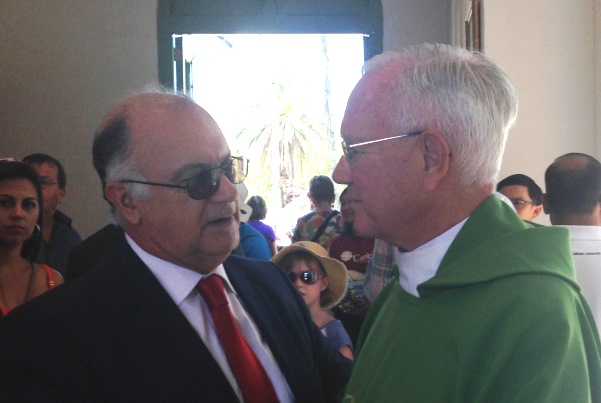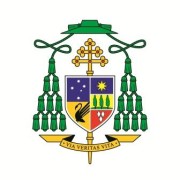Archbishop launches Project Compassion
2015 LAUNCH OF CARITAS'S 'PROJECT COMPASSION'
St Mary's Cathedral, Victoria Square, Perth -- Sunday, 15 February 2015

Archbishop Costelloe with Caritas staff from the Archdiocese of Perth (PHOTO SUPPLIED)
In the company of the Right Honourable Lord Mayor of Perth, Her Worshipful Lisa Scaffidi, and an entourage from Perth’s Italian twin city, Vasto, which included the city’s Mayor, Luciano Antonio Lapenna, Archbishop Tim Costelloe launched Project Compassion across the Archdiocese of Perth for 2015 at St Mary’s Cathedral.
“Project Compassion 2015 focuses on the theme Food For Life,” said the Archbishop. “Through Caritas, the Church is seeking to throw a spotlight on global food issues and again, through the aid and development programs sponsored by Caritas, empower the world's poorest people to establish sustainable food sources for life.”
The Archbishop went on to speak of how “Project Compassion is focused on giving people hope, and does so in a way that deeply respects the dignity of people’s right to self-determination”. He stated that “we are not really handing out charity” but rather that “we are helping people to live the lives God has created them to live: light of joy, lives of dignity, and lives of hope”.
Quoting Project Compassion’s 2014 total fundraising of $11 million, the Archbishop invited the Catholic community to take home with them a Project Compassion gift box and suggested that families “make this a special part of your Lenten journey this year”.
To find out more about Project Compassion and to obtain a gift box, please visit
www.caritas.org.au/projectcompassion or call 08 9422 7922.

Archbishop Timothy Costelloe with Their Worshipfuls the Lord Mayors of Perth and of Vasto, with invited guests (PHOTO SUPPLIED)

Joe Scaffidi (left), husband of Perth's Lord Mayor, talks to Cathedral Dean, Mgr Michael Keating, after Sunday's Solemn Mass (PHOTO SUPPLIED)

Sixth Sunday in Ordinary Time – Year B
Homily by the Most Rev Tim Costelloe SDB, Archbishop of Perth
Sunday 15 February 2015 – St Mary’s Cathedral, Perth
[Readings Leviticus 13:1-2,22-46; Psalm 32:1-2,5,11; 1 Corinthians 10:31-11:1; Mark 1:40-45]
One of the most fundamental teachings of our Christian faith is our belief in the incarnation. The word “incarnation” is a technical one of course but what it really means is that Jesus is not just a good man who lived two thousand years ago, or even the best man who ever lived, but is in fact God among us as one of us. Those of us who are old enough will remember being taught that Jesus is “true God and true man”, fully divine and fully human. How this can be – how a flesh and blood man can actually be God among us – is one of the great mysteries of our faith. But this is what we believe. It is, in fact, what we say every Sunday when we recite the Creed.
I believe in one Lord Jesus Christ,
the Only Begotten Son of God,
born of the Father before all ages.
God from God, Light from Light,
true God from true God,
begotten, not made, consubstantial with the Father;
Like all the teachings of our faith this is not meant to be just empty words. We are invited to think about what it means, what it implies and what it is calling us to.
In one of his letters Saint Paul sums it up well: Jesus Christ he tells us “is the image of the invisible God”. What this means is that when we listen to the words of Jesus we are listening to the words of God spoken to us in a way we can understand. When we see Jesus in all kinds of encounters with different people, and see how he deals with them, we are seeing, expressed in a human way so that we can understand it easily, the way in which God deals with us. And because the words of Jesus, and the actions of Jesus, enable us to catch a glimpse of his mind and heart – because they reveal what is really important to him – then we are being given a glimpse into the mind and heart of God and are being helped to understand what is really important to God.
It is very important I think for all of us to keep this in mind each time we pick up the gospels or hear them read at Mass. A good question we might carry with us is this: what kind of man must Jesus have been to be able to speak like, this, or act like this? And as we reflect on these questions and think about them more deeply we are not just discovering what kind of man Jesus was, and is – we are discovering what kind of God we believe in. This is what it means to say that Jesus was both true God and true man – in his humanity, his human characteristics, we are being drawn into the profound mystery of God, and especially of how God sees us, and loves us.
As we think of today’s gospel, then, we see that Jesus is a man moved very deeply by compassion for people who suffer. When the man with leprosy says to him, “Lord, if you want to you can cure me” Jesus responds immediately from the heart: “Of course I want to - be cured”. There is no doubt, no putting things off, no finding excuses: Jesus just responds – and responds with great compassion,
There is something else interesting about this story. Jesus tells the man not to share his story with anyone but the Jewish priests, but the man ignores Jesus and begins telling everyone who will listen. We can understand his enthusiasm and his need to tell others about his good fortune, but we might also understand if Jesus were to be frustrated and disappointed by the man’s failure to do as he asked. There is no hint in the gospel story however of Jesus being upset or put out because of the inconvenience the man has caused him, much less any sense that Jesus seeks him out to rebuke him. Instead Jesus simply accepts what has happened and adjusts his plans accordingly. There is a serenity and a peace about Jesus which is very striking.
We may not be suffering the disease of leprosy but each one of us also carries wounds and scars. We may be suffering the disease of anger, or of bitterness, or of forgiveness, or of g reed. What today’s gospel assures us of is this: if we can find within ourselves the courage to bring our frailty, our brokenness and our failure to the Lord he will welcome us with the same compassion, the same understanding, and the same generous love with which he welcomed the leper. In him we will meet the God who calls to us and who offers us forgiveness, life and hope. He will help us, and heal us, in the ways that he knows are best for us – and these may be different from the ways we are looking for. But we can be sure that God, who in Jesus revels himself as a God of endless compassion and love, will not walk away from us, or leave us to our own devices.
All we have to do is come to him – with honesty, with humility and with hope – just as the leper did in today’s gospel. The question for each of us today is: am I ready to do this?
